Workshop: International Experience on Energy Tariff Reforms // Семинар: Международный опыт по реформе тарифов на энергоносители
The event is organized by the:
Ministry of Energy of Uzbekistan, Ministry of Economy and Finance of Uzbekistan
Agency for Strategic Reforms under the President of the Republic of Uzbekistan
and with the support of the World Bank and ERRA

Background Information // Общая информация
Uzbekistan’s energy sector is a significant contributor to the country’s economy, accounting for about 13 percent of industrial output in 2021. Energy is a source of export earnings, predominantly of natural gas, whose export brought 717 million USD of hard currency to the country in 2021 making 49.8% more revenue than 2020. The energy sector is also among the largest job providers, employing about 150,000 people.
Uzbekistan ranks among top 25 countries with highest fossil fuel subsidies with total subsides accounting for 6.6 percent of GDP in 2020. Domestic natural gas prices are underpriced standing at about half of its prevailing cost, entailing significant subsidies across the economy. Similarly, the electricity tariffs stand at around 70 percent of its cost. The current situation of artificially low tariffs and high subsidies results in: (i) large portion of sector assets being obsolete and in need of modernization or replacement; (ii) lack of proper pricing signal for renewable energy scale up – renewable energy capacity addition; (iii) lack of incentives to save energy and optimize energy consumption; and (iv) shrinking the fiscal space with fossil fuel subsidies and narrowing resources for other priorities.
To tackle all the above-mentioned challenges, the GoU has initiated a broad energy sector reform that envisages addressing fundamental issues and introducing competitive principles in sector management and operations. As part of the energy reform efforts in Uzbekistan, with the support from the World Bank and development partners, the Government has been undertaking major steps in reforming the sector. Sector oversight functions were consolidated under the Ministry of Energy (MoE) established in February 2019 followed by unbundling of Uzbekenergo (UE, vertically integrated power utility) in March 2019, and Uzbekeneftegaz (UNG, vertically integrated oil & gas utility) in July 2019 as first steps toward the creation of a more competitive electricity market in Uzbekistan.
In addition, energy tariff reforms have commenced and remain a top priority. In April 2019, the GoU adopted a new electricity tariff methodology setting out a path for tariffs to be systematically adjusted to full cost recovery levels. Moreover, supported by the World Bank, the GoU implemented two tariff adjustments in 2018–2019 that collectively increased the weighted‐average tariff of electricity and gas by around 70 percent. However, despite the recent tariff reforms, the current level of retail electricity tariffs stands at around 70 percent and gas tariffs – at 50 percent of its cost-recovery level. Tariff reforms paused in 2020-2021 due to the impacts of COVID-19 and the war in Ukraine and are planned to resume in 2023 to reach power and gas tariffs cost recovery by 2026. To this end, the GoU has requested the World Bank support to organize a workshop on energy subsidy reforms.
Agenda // Повестка дня
- Jurabek Mirzamahmudov, Minister of Energy, Uzbekistan
- Marco Mantovanelli, Country Manager for Uzbekistan, World Bank
- Ardian Berisha, Moderator
- Representative of the Government of Uzbekistan
- Maksudjon Safarov, Senior Energy Specialist, World Bank
- Ardian Berisha, Regulatory Specialist, ERRA
- Sudeshna Ghosh Banerjee, Practice Manager for Europe and Central Asia Energy, World Bank
- Jurabek Mirzamahmudov, Minister of Energy, Uzbekistan
ERRA reserves the right to change the published agenda at any time during the organisation and implementation of the programme.

